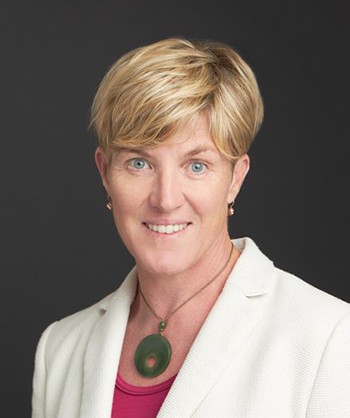

Donahue and DiFelice Endowed Chair
Associate Dean for Research

McGuinn 115
Email: kirsten.davison@bc.edu
SSWK9982 Research grant writing for the health and behavioral sciences
Parenting and children's lifestyle behaviors (e.g., diet, physical activity and sleep)
Family interventions to prevent child obesity
Physical activity and child mental health
Development and validation of conceptual frameworks and parent-report surveys
Community-based participatory research
Implementation science
Kirsten Davison is the Donahue and DiFelice Endowed Chair and Associate Dean for Research in the School of Social Work at Boston College, where she directs the THRIVE Lab. Her research and teaching focus on the health and well-being of children and families. Prior to joining Boston College in 2019, she held faculty appointments at the University at Albany School of Public Health (2003–2011) and the Harvard T.H. Chan School of Public Health (2011–2019).
Dr. Davison’s research centers on developing and evaluating family- and community-based interventions aimed at supporting children’s nutrition, sleep, emotional regulation, and overall well-being. These interventions are designed and implemented in collaboration with community partners, using participatory methods that position parents as agents of change. Key partners include public school districts, special education schools, state health departments, community health centers, hospitals, and social service programs.
Dr. Davison is currently leading two five-year studies, supported by more than $4 million in funding from the National Institutes of Health. The first, Fathers & Families, is a cohort study involving over 1,200 biological, adoptive, and social fathers of preschool-aged children (ages 1–6 years) and their co-parents. This study comprehensively examines the role of fathers in childhood obesity prevention, with a specific focus on their parenting practices related to children's diet, physical activity, and sleep behaviors.
The second study, MI Vacuna, is an intervention designed to assess whether integrating vaccination into a behavioral health setting can increase COVID-19 and influenza vaccination rates among Latinx adults with mental illness. In collaboration with NeighborHealth, behavioral health clinicians are trained to use motivational interviewing to engage Latinx patients who are missing vaccines in guided conversations about vaccination. Leveraging the integrated care setting, behavioral clinicians link patients who decide they would like to be vaccinated with a nurse using a “warm handoff.”
Dr. Davison actively engages students at all levels in her research and has mentored more than 20 doctoral students and postdoctoral fellows. Students interested in collaborating with Dr. Davison and the THRIVE Lab on either study are encouraged to contact her at kirsten.davison@bc.edu.
Davison K.K., Birch L.L. Childhood overweight: a contextual model and recommendations for future research. Obesity Reviews. 2001; 2(3):159-171.
Davison K.K., Gicevic S., Aftosmes-Tobio A., et al. Fathers' Representation in Observational Studies on Parenting and Childhood Obesity: A Systematic Review and Content Analysis. American Journal of Public Health. 2016;106(11):1980.
Bowling A, Slavet J, Miller D, Hanuese S, Beardsley W, Davison KK. Cybercyling effects on classroom behavior in children with behavioral health disorders: An RCT. Pediatrics 2017;139(2): e20161985.
Beckerman J.P., Aftosmes-Tobio A., Kitos N., Jurkowski J.M., Lansburg K., Kazik C., Gavarkovs A., Vigilante A., Kalyoncu Z.B., Figueroa R., Klabunde R., Barouch R., Hanuese S., Taveras E., Davison K.K. and the CHL study team. Communities for Healthy Living (CHL) – A family-centered childhood obesity prevention program integrated into Head Start services: Study protocol for a pragmatic cluster randomized trial. Contemporary Clinical Trials. 2019, 78, 34-45.
Gago C, Jurkowski J, Beckerman-Hsu J, Aftosmes-Tobio A, Figueroa R, Oddleifson C, Mattei J, Kenney E, Haneuse S, & Davison KK. Exploring a theory of change: Are increases in parental empowerment associated with healthier weight-related parenting practices? Social Science and Medicine. 2022: Mar; 296: 114761.
Grafft, N., Aftosmes-Tobio, A., Gago, C., Lansburg, K., Beckerman-Hsu, J., Trefry, B., Kumanyika, S & Davison, KK. (in press). Adaptation and implementation outcomes of a parenting program for low-income, ethnically diverse families delivered virtually versus in-person. Translational Behavioral Medicine.
Fathers & Families
08/12/19 - 04/30/24 (R01HD098421)
Paternal Effects on Child Weight Outcomes
Sponsor: NIH, National Institute of Diabetes and Digestive and Kidney Diseases
Role: Co-Principal Investigator (Multi-PI with Jess Haines)
MI VACUNA (Motivational Interviewing for VACcine Uptake in latiNx Adults)
09/26/2022 – 6/30/2027 (R01NR20482)
Leveraging community- based behavioral health to increase vaccine uptake in Latinx adults with mental illness
Sponsor: NIH, National Institute of Nursing Research
Role: Principal Investigator (Multi-PI with Rocío Calvo and Sebastien Haneuse)
2019 Donahue and DiFelice Professorship, Boston College
2017 Alice Hamilton Award, Harvard School of Public Health
2017 Leadership Institute, Society for Behavioral Medicine
2011 Donald and Sue Pritzker Professorship, Harvard School of Public Health